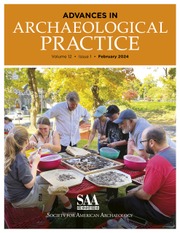Article contents
Undergraduate Teaching and Assassin's Creed
Discussing Archaeology with Digital Games
Published online by Cambridge University Press: 23 April 2021
Abstract
Digital tools are widely used in archaeology for excavation, research, and communication of results. Recently, due in large part to the COVID-19 pandemic, there has been a significant increase in the use of these resources in the classroom. The use of digital games for teaching undergraduate archaeology courses has been explored by a number of educators, but the majority of instructors continue to see this medium as lacking any particular educational merit. To combat this conclusion, in this article, the author explores some of the ways that unmodified digital games can be integrated into undergraduate archaeology courses to inspire critical discussions. She discusses two main types of games—conceptual simulations and realist simulations—to show how these can help students better understand theoretical approaches to archaeological interpretation and to consider the most effective form of archaeological reconstructions for different audiences. The author highlights her own experiences teaching with Assassin's Creed: Origins to show the benefits and challenges of working with this medium, and she includes student responses to the use of digital games in discussions. An example of a student assignment and an example of a project prompt are provided as supplemental materials to further encourage the use of digital games in the classroom.
Las herramientas digitales se usan ampliamente en la arqueología para la excavación, investigación y comunicación de resultados. Recientemente, debido en gran parte a la pandemia de COVID-19, ha habido un incremento significativo en el uso de estos recursos en el aula. El uso de juegos digitales en la enseñanza de la arqueología a nivel superior ha sido investigado por diversos instructores, pero la mayoría continúan considerando que este medio carece de mérito académico. Para combatir esta noción, la autora explora algunas formas en que los juegos digitales no modificados pueden ser integrados en los cursos de arqueología para inspirar discusiones críticas. Se discuten dos tipos de juegos, las simulaciones conceptuales y las simulaciones realistas, para demostrar como pueden ayudar a los estudiantes a entender mejor los acercamientos teóricos a la interpretación arqueológica, y a considerar la forma más efectiva de reconstrucción arqueológica para diferentes públicos. La autora enfatiza sus propias experiencias utilizando Assassin's Creed: Origins para demostrar los beneficios y retos que representa este medio, incluyendo la respuesta de los estudiantes al uso de juegos digitales en las discusiones. El material suplementario incluye ejemplos de una tarea y un proyecto para motivar el uso de juegos digitales en el aula.
Keywords
- Type
- Article
- Information
- Copyright
- Copyright © The Author(s), 2021. Published by Cambridge University Press on behalf of Society for American Archaeology
References
REFERENCES CITED
LUDOGRAPHY
- 5
- Cited by


